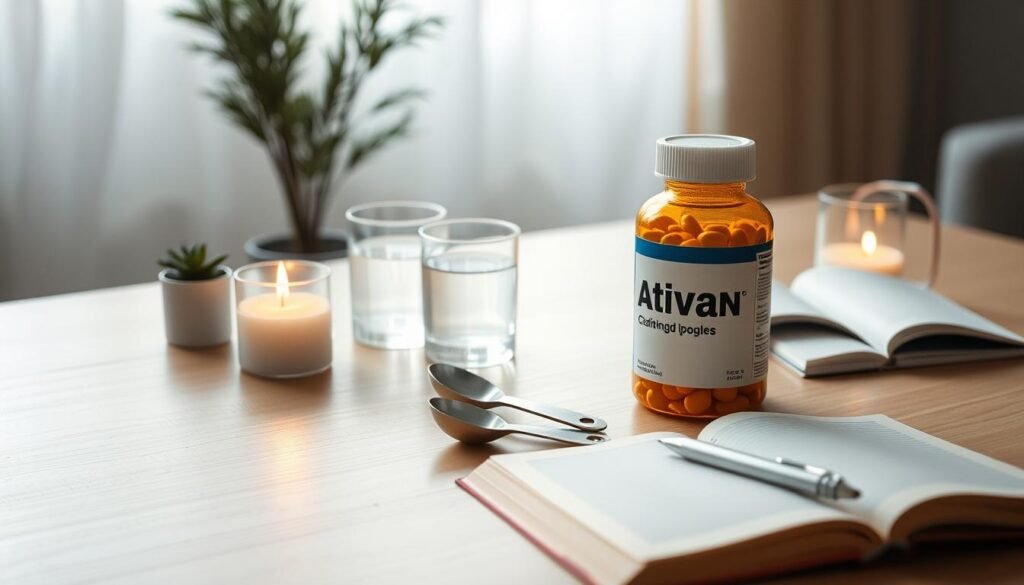Did you know about 31.1% of American adults will face an anxiety disorder eventually? This fact shows how crucial it is to have effective treatments. Ativan stands out as a top choice for easing anxiety. Knowing the right Ativan dosage for anxiety relief is key for those wanting fast and helpful symptom control. This guide simplifies Ativan’s details, focusing on uses, doses, and safety tips. It helps people make informed decisions about using Ativan to manage anxiety.
Key Takeaways
- Ativan’s dosage range for treating anxiety generally falls between 1 mg and 10 mg per day.
- Dosage adjustments may be necessary based on individual factors such as age and health conditions.
- The maximum recommended daily dose for managing anxiety is typically 10 mg, divided into multiple doses.
- Ativan is available in tablet strengths of 0.5 mg, 1 mg, and 2 mg, as well as liquid forms.
- Long-term usage of Ativan is not recommended and should be monitored closely.
- Be aware of the potential side effects and consult a healthcare provider for personalized dosage plans.
What is Ativan?
Ativan is a well-known anxiety medication, also called lorazepam. It’s a type of drug known as benzodiazepines. It’s used for treating anxiety disorders, controlling seizures, and as a sedative before medical procedures. Knowing how Ativan works is key for those thinking about using it.
Overview of Ativan and Its Uses
This medicine is used mainly for treating anxiety. It helps calm panic attacks and anxiety disorders. It is also given to patients before surgery to help them relax. This makes Ativan a common choice among doctors.
How Ativan Works
Ativan calms the brain by boosting the effects of GABA, a neurotransmitter. This helps lower anxiety and brings about relaxation. Users might not feel its effects right away, but it usually starts working within 20 to 30 minutes after taking it.
Forms and Strengths of Ativan
Ativan comes in different forms to meet various needs:
| Form | Strength |
|---|---|
| Oral Tablet | 0.5 mg, 1 mg, 2 mg |
| Injectable | 2 mg/mL, 4 mg/mL |
Dosage of Ativan depends on the patient’s condition and how they respond to the treatment. Dosages range from 1 mg to 4 mg daily, as determined by a doctor. It’s important to follow the doctor’s guidance closely, as stopping Ativan suddenly can cause withdrawal symptoms.
For more detailed information regarding its effects and potential risks visit
Understanding Anxiety Attacks
Anxiety attacks can come on suddenly, feeling like intense fear that takes over. They show up in different ways, affecting thoughts and bodies. Knowing the signs is key to handle and manage them well.
Symptoms of Anxiety Attacks
Common symptoms include:
- Rapid heartbeat
- Shortness of breath
- Dizziness
- Overwhelming feelings of dread
Symptoms can last for various times and make people worry about more attacks. Learning about these signs helps people find help and act when needed.
Impact of Anxiety on Daily Life
Anxiety can really change how one lives. People might stay away from places or things that remind them of past attacks. This can lead to feeling alone and upset.
Such behavior makes loneliness worse, and it’s hard to stop. Anxiety can also mess with jobs, relationships, and happiness. Handling it right is important for a good life.
Ativan Dosage for Anxiety Attack Relief
Finding the right Ativan dose for anxiety relief is very important. Doctors look at each person’s needs and consider many factors when advising on the dose. Knowing about these can help people deal with their anxiety better.
Typical Dosage Recommendations
People usually take 2 to 3 mg of Ativan daily for anxiety. The amount can vary from 1 to 10 mg, based on how severe the condition is. This medicine is often taken in smaller amounts throughout the day. For situations like surgery preparation, the dose can go up to 2-4 mg. This is either taken the evening before or right before surgery. Older adults might start with 1 or 2 mg a day to avoid bad side effects.
Factors Influencing Dosage
Ativan dosage for anxiety attack treatment depends on several things. These include:
- Severity of Anxiety: Stronger anxiety might need more Ativan.
- Individual Tolerance: How a person has responded to similar medicines in the past affects how they’ll respond to Ativan.
- Age: Older people may need their Ativan dose adjusted, as they process it differently.
- Health Status: Other health issues and medicines can change how Ativan works.
Doctors should regularly check on their patients to adjust the dose as needed. This helps achieve the best results from the treatment.
How to Take Ativan Safely
Taking Ativan correctly is very important. You must follow administration guidelines closely for it to work right and be safe. Listening to your healthcare provider’s advice is key to avoiding possible negative effects from this drug.
Administration Guidelines
Ativan comes in pills that you can take with or without eating. Only medical professionals should use the injectable form. The FDA has issued warnings about the risk of addiction and misuse. It’s important to take only the amount your doctor prescribes to avoid overdose and its serious risks.
Dosage Adjustments and Monitoring
Keeping an eye on how you use Ativan is crucial, especially if your dose changes. Suddenly stopping Ativan can cause withdrawal symptoms, so always talk to your doctor before making any changes. When Ativan is used with opioids, there’s a higher danger of deadly side effects. In such cases, having naloxone (Narcan) on hand is recommended to reverse an opioid overdose.

Potential Side Effects of Ativan
If you’re thinking of using Ativan for anxiety, it’s key to know its side effects. The Ativan side effects range from mild to severe. Understanding them helps with making smart choices about your health.
Common Side Effects
Ativan could cause common side effects that might affect your day. These include:
- Drowsiness
- Dizziness
- Loss of coordination
- Headache
- Nausea
- Blurred vision
- Constipation
- Dry mouth
- Changes in appetite or weight
Its sedative effect increases the risk of getting hurt. So, be extra careful during daily activities.
Serious Side Effects to Watch For
Some serious side effects need immediate doctor’s help. Watch out for:
- Respiratory depression
- Severe drowsiness or confusion
- Convulsions or seizures
- Low blood pressure
- Dependence and addiction
- Allergic reactions, including swelling and hives
- Thoughts of suicide or self-harm
Always keep an eye on these signs. And talk to a doctor if they show up. Knowing overdose signs like pale skin, shallow breaths, and fainting is life-saving.
| Side Effect Type | Examples | Severity Level |
|---|---|---|
| Common Side Effects | Drowsiness, Dizziness, Nausea | Mild to Moderate |
| Serious Side Effects | Respiratory Depression, Seizures | Severe |
Managing Anxiety with Ativan
Managing anxiety often uses many methods. Ativan can quickly help, but should be one part of your care. Adding things like cognitive-behavioral therapy (CBT) and support from loved ones makes Ativan work better.
Effective Strategies for Use
Start Ativan with the lowest dose that works, from 0.5 to 2 mg, taken up to four times daily. Everyone reacts differently, so your dose may need to change to get the best results. Ativan works fast, especially through an IV, taking 1 to 3 minutes to kick in.
Knowing the side effects is important for safe use. If you feel drowsy or dizzy, tell your doctor right away. For all you need to know on using Ativan safely, check this essential resource.
When to Seek Additional Help
If Ativan isn’t improving your anxiety, or if it gets worse, see a doctor. They might suggest counseling or changes in your lifestyle. For serious issues like panic attacks or thoughts of self-harm, get medical help immediately. Getting the right help quickly is key to managing anxiety well.

Ativan Dosage for Panic Attacks
It’s important to treat panic attacks quickly and effectively. Ativan, though not officially for panic attack treatment, is often used. Finding the right dosage is key, especially for sudden panic symptoms.
Dosage Overview and Recommendations
The dosage for panic attacks usually starts low. It typically begins at 2 mg to 3 mg per day. Based on how someone responds, adjustments are made. But, the total daily dose should not go over 10 mg. This is split into two or three doses.
Differences Compared to General Anxiety Treatment
Using Ativan for panic attacks is a bit different than for general anxiety. Panic attacks come on fast and hit hard. This means dosages need careful watching. And sometimes, doses are changed more quickly than for general anxiety.
| Condition | Typical Dosage Range | Administration Frequency |
|---|---|---|
| Panic Attacks | 2 mg – 10 mg per day | Divided into 2-3 doses |
| General Anxiety Disorder | 2 mg – 6 mg per day | Divided into 2-3 doses |
Long-term Use of Ativan
Using Ativan for a long time can bring up challenges that might not be obvious at first. It works well for anxiety and panic disorders. But, using it for too long carries big risks. Knowing these risks is key for anyone thinking about or already taking Ativan for a while.
Risks Associated with Prolonged Use
The risks of prolonged use involve getting physically dependent and having tough withdrawal symptoms when stopping. About 40% of people who use drugs like Ativan for over six months face these withdrawal issues. Stopping suddenly could cause seizures in 20% to 30% of these folks. Mixing Ativan with other sedatives or opioids raises the risk of overdose, a worrisome trend lately.
Guidelines for Safe Long-term Management
For safe long-term management, regular check-ups with a doctor are crucial. They can see if you still need Ativan and look at other ways to treat anxiety. Doctors often suggest lowering the dose bit by bit to avoid withdrawal symptoms. Support might also include therapies like CBT, which help manage anxiety safely. For more help, check out this resource.
| Risk Factors | Details |
|---|---|
| Withdrawal Symptoms | Moderate to severe symptoms can occur in 40% of long-term users. |
| Seizure Risk | 20% to 30% of those discontinuing may experience seizures. |
| Overdose Potential | Increased risk when combined with opioids or alcohol. |
| Protracted Withdrawal | 10% to 25% of long-term users may experience prolonged withdrawal symptoms. |

Consulting Your Doctor about Ativan
Talking with a healthcare professional about Ativan is key. It ensures you get treatment that fits your health needs. A right dose is vital for the best outcome and avoiding side effects. By sharing your symptoms, you and your doctor can see how Ativan fits into your anxiety care.
Importance of Personalized Dosage
Everyone’s body reacts differently to medicine. That’s why getting the dose just right is important. A doctor’s visit allows them to look at things like your age, weight, and health. This way, they can set a dose that’s both safe and effective for you. Because everyone’s different, your dose may change over time to fit your needs better.
Questions to Ask Your Healthcare Provider
Here are some key questions to ask your doctor to better understand your treatment choices:
- What is the recommended starting dosage for Ativan in my case?
- How should I adjust my dosage if I experience side effects?
- Are there any alternative treatments available if Ativan is not suitable for me?
- What precautions should I take while using Ativan?
- How will my overall health impact my treatment plan with Ativan?
Conclusion
Ativan is very important for stopping anxiety attacks because of its proven effects. To get the best results and avoid bad side effects, it’s key to know the right amount to take. This guide aimed to give detailed information on how Ativan works, how to use it right, and why following the doctor’s orders is crucial.
Working with healthcare providers is crucial when dealing with anxiety. They make sure the treatment fits what each person needs. Being aware of all possible side effects also helps in taking care of your mental health better.
Ativan can really help manage anxiety if used the right way. With the right advice and regular checks, people can better handle their anxiety. This leads to a better life quality.